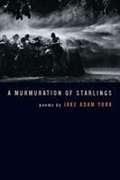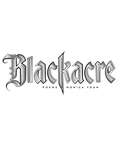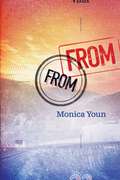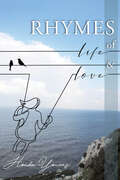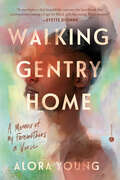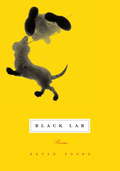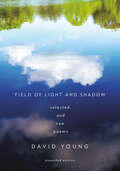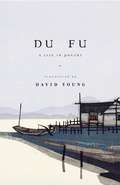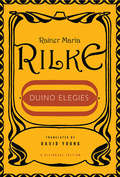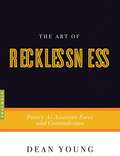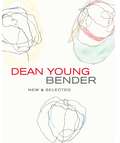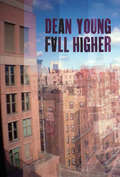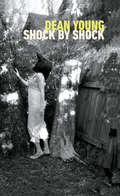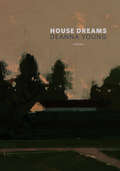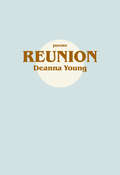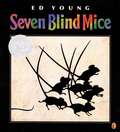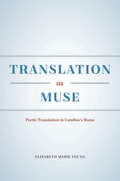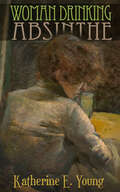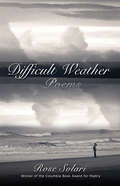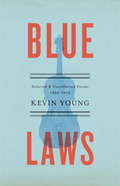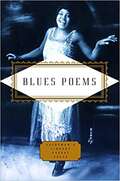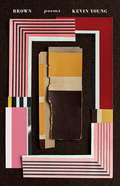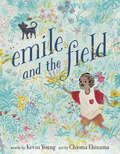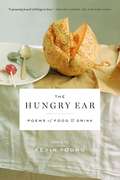- Table View
- List View
A Murmuration of Starlings
by Jake Adam YorkThis book elegizes the martyrs of the civil rights movement, whose names are inscribed on the stone table of the Civil Rights Memorial in Montgomery, Alabama. <P><P> Individually, Jake Adam York’s poems are elegies for individuals; collectively, they consider the violence of a racist culture and the determination to resist that racism. York follows Sun Ra, a Birmingham jazz musician whose response to racial violence was to secede from planet Earth, considers the testimony in the trial of J. W. Milam and Roy Bryant for the murder of Emmet Till in 1955, and recreates events of Selma, Alabama, in 1965. Throughout the collection, an invasion of starlings images the racial hatred and bloodshed. <P><P>While the 1950s spawned violence, the movement in the early 1960s transformed the language of brutality and turned the violence against the violent, says York. So, the starlings, first produced by violence, become instruments of resistance. York’s collection responds to and participates in recent movements to find and punish the perpetrators of the crimes that defined the civil rights movement. This book participates in the search for justice, satisfaction, and closure.
Blackacre: Poems
by Monica Youn*Winner of the William Carlos Williams Award**National Book Critics Circle Award Finalist**Included in The New York Times Best Poetry of 2016**Named one of The Washington Post's Best Poetry Collections of 2016** Longlisted for the National Book Award*“Blackacre” is a centuries-old legal fiction—a placeholder name for a hypothetical estate. Treacherously lush or alluringly bleak, these poems reframe their subjects as landscape, as legacy—a bereavement, an intimacy, a racial identity, a pubescence, a culpability, a diagnosis. With a surveyor’s keenest tools, Youn marks the boundaries of the given, what we have been allotted: acreage that has been ruthlessly fenced, previously tenanted, ploughed and harvested, enriched and depleted. In the title sequence, the poet gleans a second crop from the field of Milton’s great sonnet on his blindness: a lyric meditation on her barrenness, on her own desire—her own struggle—to conceive a child. What happens when the transformative imagination comes up against the limits of unalterable fact?
From From: Poems
by Monica Youn“Where are you from . . . ? No—where are you from from?” It’s a question every Asian American gets asked as part of an incessant chorus saying you’ll never belong here, you’re a perpetual foreigner, you’ll always be seen as an alien, an object, or a threat. Monica Youn’s From From brilliantly evokes the conflicted consciousness of deracination. If you have no core of “authenticity,” no experience of your so-called homeland, how do you piece together an Asian American identity out of Westerners’ ideas about Asians? Your sense of yourself is part stereotype, part aspiration, part guilt. In this dazzling collection, one sequence deconstructs the sounds and letters of the word “deracinations” to create a sonic landscape of micro- and macroaggressions, assimilation, and self-doubt. A kaleidoscopic personal essay explores the racial positioning of Asian Americans and the epidemic of anti-Asian hate. Several poems titled “Study of Two Figures” anatomize and dissect the Asian other: Midas the striving, nouveau-riche father; Dr. Seuss and the imaginary daughter Chrysanthemum-Pearl he invented while authoring his anti-Japanese propaganda campaign; Pasiphaë, mother of the minotaur, and Sado, the eighteenth-century Korean prince, both condemned to containers allegorical and actual. From From is an extraordinary collection by a poet whose daring and inventive works are among the most vital in contemporary literature.
Rhymes of Life and Love
by Houda YounesCan we ever figure out what life is about? Dig deep into the rhyming symphonies of enticing love, fly over the dazzling winds of ambition, push through the bright lightening of daily struggles, and always remember: It will definitely shine after the darkness!This book is a collection of poems written across many years of social and emotional explorations that we go through in life. “Rhymes of Life” focus on the social aspects such as self-help topics, family relationships, friendship, life-changing decisions, social struggles, … “Rhymes of Love” focus on romantic relationships all the way from falling in love to dealing with break-ups and then moving on.
Walking Gentry Home: A Memoir of My Foremothers in Verse
by Alora YoungAn &“extraordinary&” (Laurie Halse Anderson) young poet traces the lives of her foremothers in West Tennessee, from those enslaved centuries ago to her grandmother, her mother, and finally herself, in this stunning debut celebrating Black girlhood and womanhood throughout American history.&“A masterpiece that beautifully captures the heartbreak that accompanies coming of age for Black girls becoming Black women.&”—Evette Dionne, author of Lifting as We Climb, longlisted for the National Book AwardWalking Gentry Home tells the story of Alora Young&’s ancestors, from the unnamed women forgotten by the historical record but brought to life through Young&’s imagination; to Amy, the first of Young&’s foremothers to arrive in Tennessee, buried in an unmarked grave, unlike the white man who enslaved her and fathered her child; through Young&’s great-grandmother Gentry, unhappily married at fourteen; to her own mother, the teenage beauty queen rejected by her white neighbors; down to Young in the present day as she leaves childhood behind and becomes a young woman. The lives of these girls and women come together to form a unique American epic in verse, one that speaks of generational curses, coming of age, homes and small towns, fleeting loves and lasting consequences, and the brutal and ever-present legacy of slavery in our nation&’s psyche. Each poem is a story in verse, and together they form a heart-wrenching and inspiring family saga of girls and women connected through blood and history.Informed by archival research, the last will and testament of an enslaver, formal interviews, family lore, and even a DNA test, Walking Gentry Home gives voice to those too often muted in America: Black girls and women.
Black Lab
by David YoungDavid Young, the distinguished poet and translator, offers us a gorgeous cycle of poems attuned to the Midwestern seasons—to weather both emotional and actual. A writer of thrilling invention and humanity, Young beckons the reader into an effortless proximity with the fox at the field’s edge, with the chattering crow and the startling first daffodils of spring. In his tour of both exterior and interior landscapes, the poet scatters his father’s ashes and remembers losing his wife, Chloe, to cancer, a loss at times still fresh after several decades; pays homage to the wisdom of the Chinese masters whose aesthetic has helped shape his own; and reflects on the gladdening qualities of a walk in a snowstorm with his black labrador, Nemo: and in this snowfall that I should detest, late March and early April, I’m still rapt to see his coat so constellated, starred, re-starred, making a comic cosmos I can love. Young’s expert shaping of this world in which, as he writes, “We’re never going to get God right. But we / learn to love all our failures on the way,” becomes for the reader a fresh experience of life’s mysterious goodness and of the abundant pleasure of the language that embodies it.
Field of Light and Shadow: Selected and New Poems
by David YoungA career-spanning volume from one of our most valuable living American poets, offering poems that display an exquisite ear tuned to the natural world, to love and friendship, and to the continually renewable possibilities of language. David Young's settings are at once local and universal--an adolescence in Omaha, late summer on Lake Erie, a sleepless night in the backyard during a meteor shower. He moves with dazzling ease between culture and nature, between the literary and the philosophical, microcosm and macrocosm. Here are poems on Osip Mandelstam and Chairman Mao, the meaning of boxcars on the track, the beautiful names of the months, and a fox at the field's edge, charged in each case by Young's fierce intelligence and candor in the face of grief and loss."We float through space. Days pass," Young writes in "The Portable Earth-Lamp." "Sometimes we know we are part of a crystal / where light is sorted and stored." His metaphysical reach, balancing remarkable humility with penetrating vision, is one of the great gifts of this exemplary career in poetry.From the Hardcover edition.
Du Fu: A Life in Poetry
by David Young Fu DuDu Fu (712-770) is one of the undisputed geniuses of Chinese poetry--still universally admired and read thirteen centuries after his death. Now David Young, author of Black Lab, and well known as a translator of Chinese poets, gives us a sparkling new translation of Du Fu's verse, arranged to give us a tour of the life, each "chapter" of poems preceded by an introductory paragraph that situates us in place, time, and circumstance. What emerges is a portrait of a modest yet great artist, an ordinary man moving and adjusting as he must in troubled times, while creating a startling, timeless body of work.Du Fu wrote poems that engaged his contemporaries and widened the path of the lyric poet. As his society--one of the world's great civilizations--slipped from a golden age into chaos, he wrote of the uncertain course of empire, the misfortunes and pleasures of his own family, the hard lives of ordinary people, the changing seasons, and the lives of creatures who shared his environment. As the poet chases chickens around the yard, observes tear streaks on his wife's cheek, or receives a gift of some shallots from a neighbor, Young's rendering brings Du Fu's voice naturally and elegantly to life.I sing what comes to mein ways both old and modernmy only audience right now--nearby bushes and treeselegant houses standin an elegant row, too manyif my heart turns to ashesthen that's all right with me . . .from "Meandering River"From the Trade Paperback edition.
Duino Elegies (A Bilingual Edition)
by David Young Rainer Maria RilkeOne of the literary masterpieces of the century, this translation is now presented with facing-page German. We have a marvelous, almost legendary, image of the circumstances in which the composition of this great poem began. Rilke was staying at a castle (Duino) on the sea near Trieste. One morning he walked out on the battlements and climbed down to where the rocks dropped sharply to the sea. From out of the wind, which was blowing with great force, Rilke seemed to hear a voice: Wer, wenn ich schriee, horte mich denn aus der Engel Ordnungen? (If I cried out, who would hear me up there, among the angelic orders?). He wrote these words, the opening of the first Duino Elegy, in his notebook, then went inside to continue what was to be his major work and one of the literary masterpieces of the century.
The Art of Recklessness: Poetry as Assertive Force and Contradiction
by Dean YoungFirst book of prose on poetry, imagination swerves into primitivism and surrealism and finally toward empathy. How can recklessness guide the poet, the artist, and the reader into art, and how can it excite in us a sort of wild receptivity, beyond craft.
Bender
by Dean Young"In Young's work, the big essential questions-mortality, identity, the meaning of life-aren't simply food for thought; they're grounds for entertainment."-Toronto Star"Surrealism seldom seems as much like real life as in Young's hilarious and cautionary poems."-BooklistBender gathers a generous selection of new work along with treasure from Dean Young's twelve volumes. Strongly influenced by Surrealism, Dean Young's poems flash with extravagant imagery, humorous speech, sly views of the quotidian, and the exposed nerves of heartache. As the American Academy of Arts and Letters raved, "Young's poems are as entertaining as a three-ring circus and as imaginative as a canvas by Hieronymus Bosch. He is one of the most inventive and satisfying poets writing today."From "Even Funnnier Looking Now":If someone had asked me then,Do you suffer from the umbrage of dawn'sdark race horses, is your heart a prisonerof raindrops? Hell yes! I would have saidor No way! Never would I have said,What could you possibly be talking about?I had just gotten to the twentieth centurylike a leftover girder from the Eiffel Tower.My Indian name was Pressure-Per-Square-Inch.I knew I was made of glass but I didn'tyet know what glass was made of: hot sandinside me like pee going all the wrongdirections, probably into my heartwhich I knew was made of gold foilglued to dust . . .
Fall Higher
by Dean Young"Young has always stood out for his sharp humor, boundless poetic energy, and sheer readability. If adventurous poetry can sometimes feel like a tenuous tightrope walk, Young's poems feel more like zip lines."-The Boston Globe"This book reads like a long, breathless thank-you for life's seemingly random jumble of beauty, strangeness, tenderness, and joy."-Los Angeles TimesFall Higher is a major collection by one of America's most inventive and entertaining writers. In this paperback release, Dean Young's work contends with the challenges of love, wryly cataloging mistakes, deterioration, and broken vows. Young's humor is as sharp as ever, and coupled with a vulnerability that renders Fall Higher his most intimate collection to date."The True Apology Takes Years"The true apology takes years.Terrible dry eyes!The tree rings grow closer and closer togetherbut the nail is swallowed.Great heaps of rubble are moved up and down the shore.Finally a dance is performed to complete the forgiveness,stamping out small fires,the whole palladium decorated with thistleslike the last twenty pages of a Victorian novel.Now that your hunger is gone you're welcome to the banquet . . . Dean Young has published twelve books of poetry, including finalists for the Pulitzer Prize and Griffin Award. He has received fellowships from the Guggenheim Foundation and the NEA, as well as an Academy Award in Literature from the American Academy of Arts and Letters. He teaches at the University of Texas and lives in Austin, Texas.
Shock by Shock
by Dean Young"Dean Young challenges the reader to hang on as he jigs from one poetic style to another and sets a wondrous course across a Duchampian landscape."--Chicago Tribune"In Young's work, the big essential questions--mortality, identity, the meaning of life--aren't simply food for thought; they're grounds for entertainment."--The Sunday Star (Toronto)Dean Young escorts his transplanted heart into invigorating poetic territory that combines the joy of being alive with his signature mixture of surrealism, humor, and fast-cut imagery. A Pulitzer finalist known for his hard-won insights, NPR said it best when they observed that Young sees "even in the smallest things the heights of what we can be."From "Harvest":Bring me the high heart of a trapezist.If not, bring me the heart of a drunk monkso I may illuminate an ancient textin a language I can't understand.The brain too is blood, blood racing100 miles an hour on training wheelsso let me splash through a red puddle,let me kiss the face of a red puddle,let me write my crazed, extreme demandson the frost-cracked window of god's splitchest... Dean Young is the author of twelve books of poetry, including finalists for the Pulitzer Prize and Griffin Award. He teaches at the University of Texas and lives in Austin.
House Dreams
by Deanna YoungHouse Dreams, Deanna Young's haunted and haunting third collection, is at once a core sample of the life we all live underground, and a view beneath the foundations of the various eras and places that make up one woman's life story. These poems have the plainspoken power, surreal shifting, uncanny logic and transformed everyday imagery of our most numinous dreams. It's as if Jung's assertion that "[w]hen an inner situation is not made conscious, it appears outside as fate," is taken up here as a reading guide back through time.
Reunion
by Deanna YoungPoems that unfold like liturgy, confronting old violence with a trembling, dignified restraint.
Seven Blind Mice
by Ed YoungA Caldecott Honor Book. "It's a pillar," says Red Mouse. "It's a fan!" cries Orange Mouse. "No, it's a spear," says Yellow Mouse. But as the seven blind mice go out one by one to investigate the strange Something by the pond, each comes back with a different idea of what it is. Argue as they might, they cannot agree. Only when the last mouse ventures out and investigates do they finally learn for certain what the strange Something is, and what the whole truth is as well! Caldecott medalist Ed Young's paper-collage illustrations joyously capture the wit and humor of this tale based on the ancient fable of the Blind Men and the Elephant. The very youngest readers will delight in Young's brightly colored mice who will lead them to discoveries of color, the days of the week, and one of the truest paths to wisdom.
Translation as Muse: Poetic Translation in Catullus's Rome
by Elizabeth Marie YoungPoetry is often said to resist translation, its integration of form and meaning rendering even the best translations problematic. Elizabeth Marie Young disagrees, and with Translation as Muse, she uses the work of the celebrated Roman poet Catullus to mount a powerful argument that translation can be an engine of poetic invention. Catullus has long been admired as a poet, but his efforts as a translator have been largely ignored. Young reveals how essential translation is to his work: many poems by Catullus that we tend to label as lyric originals were in fact shaped by Roman translation practices entirely different from our own. By rereading Catullus through the lens of translation, Young exposes new layers of ingenuity in Latin poetry even as she illuminates the idiosyncrasies of Roman translation practice, reconfigures our understanding of translation history, and questions basic assumptions about lyric poetry itself.
Woman Drinking Absinthe
by Katherine E. YoungFrom the naïve girl who willfully ignores evidence of Bluebeard's crimes, to Manet's dispirited barmaid at the Folies-Bergère, to the narrator of the book's opening sequence, who sacrifices domestic security for a passionate lover who will eventually abuse her, the women of these poems brush abandon convention at their peril, even though convention also imperils their bodies, their spirits, and their art. In this second collection, Young—whose earlier Day of the Border Guards explored Russian history and literature—continues to employ what she's learned from the great Russian writers she often translates. Like Marina Tsvetaeva, who makes a cameo appearance here, Young finds literary touchstones among sources as varied as German folk tales, Greek drama, and the Old Testament. Whether tracing the elements of Euclidean geometry or the terrain of a Civil War battlefield in Tennessee, these poems ask the hard questions: Why does love fail? How can art come from pain? What heals the soul?
Difficult Weather
by Katherine Young Rose SolariThis new edition of the first full-length collection of poems by award-winning writer Rose Solari provides an important window into the origins and early influences of this now-established poet and novelist. Though most of these poems are set in Washington, DC, and its less affluent suburbs, their lyrical, often elegiac depictions of family and neighborhood life, first love and first losses, will be sure to touch anyone who, like Solari, grew up in a place "more interesting than safe." In selecting Difficult Weather for the Columbia Book Award, Carolyn Forché, now Director of the Lannan Center for Poetry, said of Solari, "Her language is by turns raw and luminous, her perceptions uncommonly acute, and her vision at once incisive and compassionate." Michael Collier, Director of the Bread Loaf Writer's Center, wrote that she is "a poet of passion and precision... Difficult Weather will delight and surprise us all." This edition features a new introduction by poet and translator Katherine E. Young, who places Solari's early work in a national context, and traces some of the poet's most powerful influences, such as the work of Anne Sexton. Its publication, timed to coincide with that of Solari's third poetry collection, The Last Girl, insures that all of Solari's published poetry collections are now in print, for her fans to savor and for new readers to discover.
Black Maria: Being the Adventures of Delilah Redbone & A.K.A. Jones
by Kevin YoungKevin Young follows his acclaimed exploration of the blues in Jelly Roll with another playful riff on a vital art form, giving us a film noir in verse. Black Maria–the title is a slang term for a police van as well as a hearse–is a twisting tale of suspicion, passion, mystery, and the city. Young channels the world of detective movies, picking up its lingo and dark glamour in five “reels” of poetry–the adventures of a “soft-boiled” private eye, known as A.K.A. Jones, and an ingenue turned femme fatale, Delilah Redbone, who’s come to town from down south (“Mama bent till dark/tending rows to send/Me to school... I wanted/ To head on & hitch... strike it/Big”). We follow Jones and Delilah through a maze of aliases and ambushes, sex and suspicions, fast talk and hard luck, in Shadowtown where noir characters abound. The Killer, The Gunsel, The Hack, The Director, The Champ, and The Snitch are among the local luminaries and beautiful losers who mingle with Jones and his elusive lady as they stalk one another through the scenes of the poet’s dazzling “treatment.” Charming, funky, bleak, humorous, picaresque, and full of pathos, Black Maria is brimming with the originality and stark lyricism we have come to expect from this remarkable poet.
Blue Laws: Selected and Uncollected Poems, 1995-2015
by Kevin YoungA rich and lively gathering of highlights from the first twenty years of an extraordinary career, interspersed with "B sides" and "bonus tracks" from this prolific and widely acclaimed poet. Blue Laws gathers poems written over the past two decades, drawing from all nine of Kevin Young's previously published books of poetry and including a number of uncollected, often unpublished, poems. From his stunning lyric debut (Most Way Home, 1995) and the amazing "double album" life of Jean-Michel Basquiat (2001, "remixed" for Knopf in 2005), through his brokenhearted Jelly Roll: A Blues (2003) and his recent forays into adult grief and the joys of birth in Dear Darkness (2008) and Book of Hours (2014), this collection provides a grand tour of a poet whose personal poems and political poems are equally riveting. Together with wonderful outtakes and previously unseen blues, the profoundly felt poems here of family, Southern food, and loss are of a piece with the depth of personal sensibility and humanity found in his Ardency: A Chronicle of the Amistad Rebels or bold sequences such as "The Ballad of Jim Crow" and a new "Homage to Phillis Wheatley."From the Hardcover edition.
Blues Poems
by Kevin YoungBorn in African American work songs, field hollers, and the powerful legacy of the spirituals, the blues traveled the country from the Mississippi delta to “Sweet Home Chicago,” forming the backbone of American music. In this anthology–the first devoted exclusively to blues poems–a wide array of poets pay tribute to the form and offer testimony to its lasting power. <p><p> The blues have left an indelible mark on the work of a diverse range of poets: from “The Weary Blues” by Langston Hughes and “Funeral Blues” by W. H. Auden, to “Blues on Yellow” by Marilyn Chin and “Reservation Blues” by Sherman Alexie. Here are blues-influenced and blues-inflected poems from, among others, Gwendolyn Brooks, Allen Ginsberg, June Jordan, Richard Wright, Nikki Giovanni, Charles Wright, Yusef Komunyakaa, and Cornelius Eady. And here, too, are classic song lyrics–poems in their own right–from Bessie Smith, Robert Johnson, Ma Rainey, and Muddy Waters. <p> The rich emotional palette of the blues is fully represented here in verse that pays tribute to the heart and humor of the music, and in poems that swing with its history and hard-bitten hope.
Brown: Poems
by Kevin YoungJames Brown. John Brown's raid. Brown v. the Topeka Board of Ed. The prize-winning author of Blue Laws meditates on all things "brown" in this powerful new collection. <p><p> Divided into "Home Recordings" and "Field Recordings," Brown speaks to the way personal experience is shaped by culture, while culture is forever affected by the personal, recalling a black Kansas boyhood to comment on our times. From "History"--a song of Kansas high-school fixture Mr. W., who gave his students "the Sixties / minus Malcolm X, or Watts, / barely a march on Washington"--to "Money Road," a sobering pilgrimage to the site of Emmett Till's lynching, the poems engage place and the past and their intertwined power. <p> These thirty-two taut poems and poetic sequences, including an oratorio based on Mississippi "barkeep, activist, waiter" Booker Wright that was performed at Carnegie Hall and the vibrant sonnet cycle "De La Soul Is Dead," about the days when hip-hop was growing up ("we were black then, not yet / African American"), remind us that blackness and brownness tell an ongoing story. A testament to Young's own--and our collective--experience, Brown offers beautiful, sustained harmonies from a poet whose wisdom deepens with time.
Emile and the Field
by Kevin YoungIn this lyrical picture book from an award-winning poet, a young boy cherishes a neighborhood field throughout the changing seasons. With stunning illustrations and a charming text, this beautiful story celebrates a child's relationship with nature. There was a boynamed Emilewho fellin love with a field.It was wideand blue--and if you could haveseen itso would've you.Emile loves the field close to his home--in spring, summer, and fall, when it gives him bees and flowers, blossoms and leaves. But not as much in winter, when he has to share his beautiful, changeable field with other children...and their sleds. This relatable and lyrical ode to one boy's love for his neighborhood field celebrates how spending time in nature allows children to dream, to imagine...and even to share.
The Hungry Ear: Poems of Food and Drink
by Kevin Young<p>Food and poetry: in so many ways, a natural pairing, from prayers over bread to street vendor songs. Poetry is said to feed the soul, each poem a delicious morsel. When read aloud, the best poems provide a particular joy for the mouth. Poems about food make these satisfactions explicit and complete. <p>Of course, pages can and have been filled about food's elemental pleasures. And we all know food is more than food: it's identity and culture. Our days are marked by meals; our seasons are marked by celebrations. We plant in spring; harvest in fall. We labor over hot stoves; we treat ourselves to special meals out. Food is nurture; it's comfort; it's reward. While some of the poems here are explicitly about the food itself: the blackberries, the butter, the barbecue--all are evocative of the experience of eating. <p>Many of the poems are also about the everything else that accompanies food: the memories, the company, even the politics. Kevin Young, distinguished poet, editor of this year's Best American Poetry, uses the lens of food - and his impeccable taste - to bring us some of the best poems, classic and current, period.</p>
